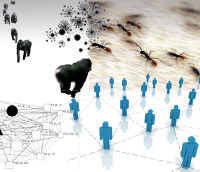Orateur
M.
David Vogel
(Centre de Recherches sur la Cognition Animales)
Description
Networks, being as abundant as different, describe a huge range of systems in nature and society. Some organisms, including fungi, ants or slime molds, explore their environment and forage by forming interconnected network. The plasmodium of P.poylcephalum is a large unicellular amoeboid which form a tubular network through which nutrients, body mass and chemicals signal are transported. Without any central system to process information slime mold when alone are able to form efficient networks. In our study we analysed the emergence of networks in a population of slime molds under both exploration and foraging context. We varied two main parameters the distance between slime molds and their size. At a global level we found that slime mold built different networks according to context: a fully connected network in absence of food promoting a full exploration of the environment and a less connected network in presence of food allowing an optimal distribution of nutrient among all the slime molds. We were able to explain the global network produced by the population of slime molds by looking at the interaction between slime molds at an individual level. Our study showed once again that slime moulds are capable of surprisingly sophisticated behavior using only decentralized information processing.
Auteur
M.
David Vogel
(Centre de Recherches sur la Cognition Animales)

